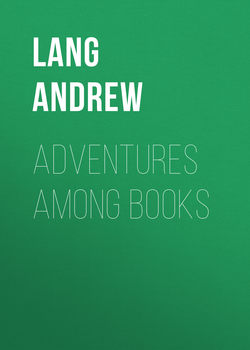Adventures Among Books

Реклама. ООО «ЛитРес», ИНН: 7719571260.
Оглавление
Lang Andrew. Adventures Among Books
PREFACE
CHAPTER I: ADVENTURES AMONG BOOKS
I
II
CHAPTER II: RECOLLECTIONS OF ROBERT LOUIS STEVENSON
CHAPTER III: RAB’S FRIEND
CHAPTER IV: OLIVER WENDELL HOLMES
CHAPTER V: MR. MORRIS’S POEMS
CHAPTER VI: MRS. RADCLIFFE’S NOVELS
CHAPTER VII: A SCOTTISH ROMANTICIST OF 1830
CHAPTER VIII: THE CONFESSIONS OF SAINT AUGUSTINE
CHAPTER IX: SMOLLETT
CHAPTER X: NATHANIEL HAWTHORNE
CHAPTER XI: THE PARADISE OF POETS
CHAPTER XII: PARIS AND HELEN
CHAPTER XIII: ENCHANTED CIGARETTES
CHAPTER XIV: STORIES AND STORY-TELLING (From STRATH NAVER)
CHAPTER XV: THE SUPERNATURAL IN FICTION
CHAPTER XVI: AN OLD SCOTTISH PSYCHICAL RESEARCHER
CHAPTER XVII: THE BOY
Отрывок из книги
In an age of reminiscences, is there room for the confessions of a veteran, who remembers a great deal about books and very little about people? I have often wondered that a Biographia Literaria has so seldom been attempted – a biography or autobiography of a man in his relations with other minds. Coleridge, to be sure, gave this name to a work of his, but he wandered from his apparent purpose into a world of alien disquisitions. The following pages are frankly bookish, and to the bookish only do they appeal. The habit of reading has been praised as a virtue, and has been denounced as a vice. In no case, if we except the perpetual study of newspapers (which cannot fairly be called reading), is the vice, or the virtue, common. It is more innocent than opium-eating, though, like opium-eating, it unlocks to us artificial paradises. I try to say what I have found in books, what distractions from the world, what teaching (not much), and what consolations.
In beginning an autobiographia literaria, an account of how, and in what order, books have appealed to a mind, which books have ever above all things delighted, the author must pray to be pardoned for the sin of egotism. There is no other mind, naturally, of which the author knows so much as of his own. On n’a que soi, as the poor girl says in one of M. Paul Bourget’s novels. In literature, as in love, one can only speak for himself. This author did not, like Fulke Greville, retire into the convent of literature from the strife of the world, rather he was born to be, from the first, a dweller in the cloister of a library. Among the poems which I remember best out of early boyhood is Lucy Ashton’s song, in the “Bride of Lammermoor”: —
.....
I confess to having learned the classical languages, as it were by accident, for the sake of what is in them, and with a provokingly imperfect accuracy. Cricket and trout occupied far too much of my mind and my time: Christopher North, and Walton, and Thomas Tod Stoddart, and “The Moor and the Loch,” were my holiday reading, and I do not regret it. Philologists and Ireland scholars are not made so, but you can, in no way, fashion a scholar out of a casual and inaccurate intelligence. The true scholar is one whom I envy, almost as much as I respect him; but there is a kind of mental short-sightedness, where accents and verbal niceties are concerned, which cannot be sharpened into true scholarship. Yet, even for those afflicted in this way, and with the malady of being “idle, careless little boys,” the ancient classics have a value for which there is no substitute. There is a charm in finding ourselves – our common humanity, our puzzles, our cares, our joys, in the writings of men severed from us by race, religion, speech, and half the gulf of historical time – which no other literary pleasure can equal. Then there is to be added, as the university preacher observed, “the pleasure of despising our fellow-creatures who do not know Greek.” Doubtless in that there is great consolation.
It would be interesting, were it possible, to know what proportion of people really care for poetry, and how the love of poetry came to them, and grew in them, and where and when it stopped. Modern poets whom one meets are apt to say that poetry is not read at all. Byron’s Murray ceased to publish poetry in 1830, just when Tennyson and Browning were striking their preludes. Probably Mr. Murray was wise in his generation. But it is also likely that many persons, even now, are attached to poetry, though they certainly do not buy contemporary verse. How did the passion come to them? How long did it stay? When did the Muse say good-bye? To myself, as I have remarked, poetry came with Sir Walter Scott, for one read Shakespeare as a child, rather in a kind of dream of fairyland and enchanted isles, than with any distinct consciousness that one was occupied with poetry. Next to Scott, with me, came Longfellow, who pleased one as more reflective and tenderly sentimental, while the reflections were not so deep as to be puzzling. I remember how “Hiawatha” came out, when one was a boy, and how delightful was the free forest life, and Minnehaha, and Paupukkeewis, and Nokomis. One did not then know that the same charm, with a yet fresher dew upon it, was to meet one later, in the “Kalewala.” But, at that time, one had no conscious pleasure in poetic style, except in such ringing verse as Scott’s, and Campbell’s in his patriotic pieces. The pleasure and enchantment of style first appealed to me, at about the age of fifteen, when one read for the first time —
.....